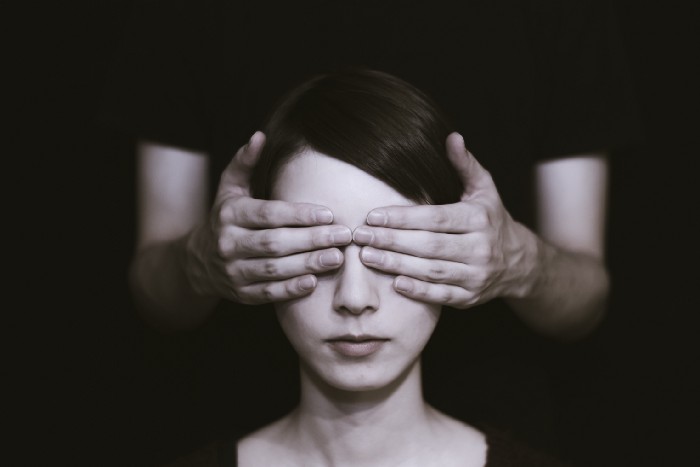
08 Aug I Really Didn’t See Her
Whiteness tries to make Black people invisible
I thought I knew a lot about racism and White privilege, so why was I was surprised when it happened right before my eyes?
I was shopping for clothes at a major department store in southern California. It wasn’t a high-end establishment — I’m not a high-end kind of person — but it wasn’t a discount place either. Their annual spring sale had drawn a large crowd of shoppers.
I found a couple flattering shirts and a new pair of flip-flops, then headed for the nearest checkout island. There were several people in line, and I queued up behind a Black woman holding a large pile of clothing. She was clearly going to need some time to pay for all that stuff. For a minute I considered going to a different cashier but changed my mind when the woman nodded a greeting.
We exchanged a few pleasantries before it was her turn at the register. She stepped up and was about to put her pile of clothes on the counter when the White saleswoman looked right past her, directly at me, smiled, and said cheerfully, “Hi! Can I help you?”
I was pretty confused at first. I figured maybe she just had wandering eyeballs and couldn’t focus where she wanted to. I smiled back and then looked away, assuming she must be addressing the Black woman.
But no! “Ma’am, hello? Can I help you?” She actually had to lean sideways a bit to see around the person who was standing right in front of her face.
“Me?” I asked.
“Yes, you. Can I help you?”
“Well sure you can help me,” I said, “after you help the lady whose turn it is.”
The Black woman looked back and forth between me and the cashier, and I saw that “you-can’t-be-serious!” expression on her face. If she had been White, I would have thought this was some kind of joke – maybe a hidden camera.
She wasn’t White though, and this wasn’t a joke. If I’d been thinking more quickly and clearly, I would have suggested to my fellow shopper that we go look for clothes at a different store. Then I would have reported the clerk to the management on my way out.
But I was still a little stunned, so I just stood there with my mouth open. By the time I got my wits together, the woman had dropped the clothes on the floor and walked away without a word.
“Why did you do that?” I asked the cashier.
“Do what?” she asked. “I didn’t do anything.”
“You ignored the woman in front of me because she was Black.”
“That’s not true!” Her voice got louder. “You were here first and she cut in front of you. I saw her!” Then she added, “I’m not a racist!”
Her words rattled my brain and stripped away any semblance of civility. “That was the most crass expression of racism I have ever witnessed coming from a sales person,” I nearly yelled.
This behavior was way out of character for me. Once again I had allowed myself to be triggered and had lost my ability to make effective choices. The cashier felt attacked and defensive, and I’d missed an opportunity to help her learn something new.
Another White woman hurried over and introduced herself as the manager. “What’s going on over here?” she asked. “Can I help in some way?”
I explained what had happened in as few words as possible, because I felt tears of frustration welling up and I didn’t want to cry. I sputtered and repeated myself several times. I finally quit talking and looked at the saleswoman.
“I don’t know why she’s so upset. No one disrespected her,” she said to her manager; then turning to me she asked, “Why are you so angry?”
Why was I so angry? Because I hadn’t said anything to the Black woman. Because I’m supposed to be an educator and I messed up. Because I’m so sick of seeing Black people hurt by White people.
Because I was the beneficiary of White privilege and I can’t make that go away.
The manager was doing her best to fix the situation. “So let’s just think this through,” she said. “Sometimes things can get a little crazy when people are checking out. And we all make mistakes from time to time. Is it possible the, um, the …” She paused and looked at me with raised eyebrows. Was she asking me which words to use??
“The Black woman,” I said.
“Yes, the Black woman . . . is it possible the Black woman was first in line? And you just didn’t see her?”
The cashier was clearly ready for this to be over. “That’s it,” she said, “just an honest mistake. I really didn’t see her.”
As if this were any kind of coherent explanation. A beautiful, brown-skinned, large-as-life woman — a woman with a credit card and an armful of items to purchase — had suddenly became invisible.
This is only one of the dangers of the social construct of Whiteness. It can make us blind.
Maybe my readers are wondering how I remember these conversations years later. After I left the store, I sat in my car and dictated the whole story into my voice recorder, which I kept with me at all times for this very reason. Now I use my phone. I have hundreds of stories like this one, all waiting to be transcribed. I share them with the hope that they will be useful examples in our struggle to become better humans.
. . .
Photo by Ryoji Iwata on Unsplash



No Comments